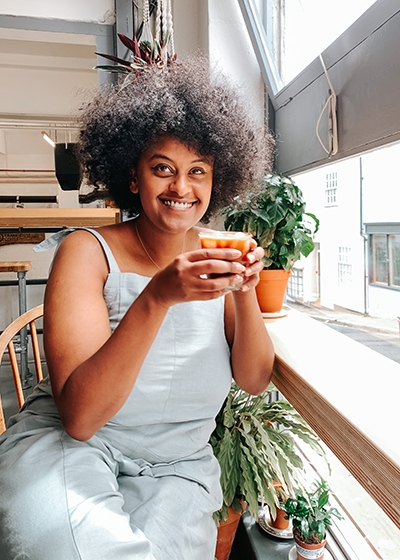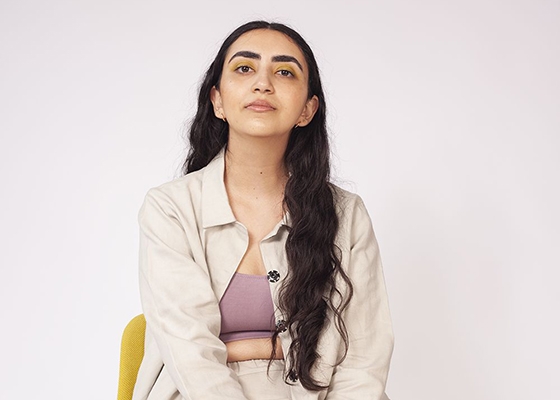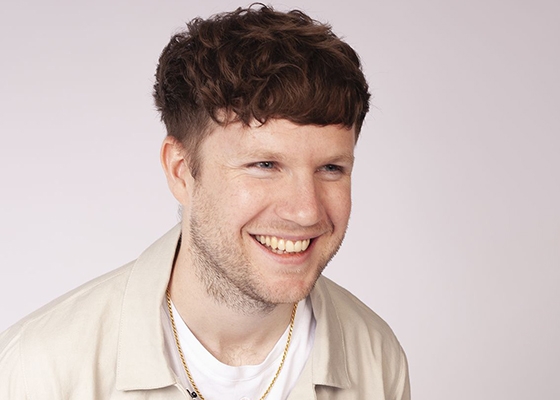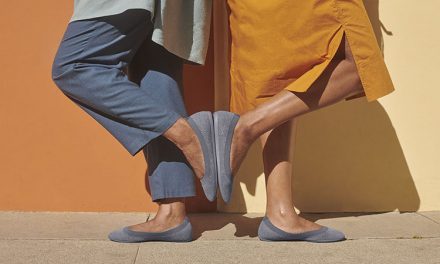Fashion Crush: Kalkidan Legesse Founder of Shwap
All Images: Shwap
Who is to blame for our fashion waste crisis? Is it brands or customers? Kalkidan Legesse is answering the ‘Big Question’ with the launch of Shwap, a resale platform that will revolutionise the way we make and consume clothes.
Who is responsible for the waste caused by purchasing too many clothes? Is it the consumer, or is it the manufacturer? Is it retailers, or is it Governments and organisations? In the scheme of big, uncomfortable questions, this has to be a front runner. No one seems to want to answer it, because if they do – that someone will be footing an enormous bill. The cost of cleaning up the waste created by the garment industry is huge, not to mention the drain on materials and energy needed to make our clothes. However, one person is not afraid to answer the big question, or facilitate the answer.
Kalkidan Legesse is a social entrepreneur and co-founder of Sancho’s, a sustainable multi brand boutique in Exeter. Speaking eloquently and passionately on the subjects of intersectional environmentalism as well as conscious consumption, Kalkidan is a well respected voice in the sustainable community. So when I heard that she was launching a new venture, one that was set to make real, tangible change, I was desperate to learn more.
Shwap is a groundbreaking idea, one that Kalkidan has worked tirelessly to bring to life, alongside her role at Sancho’s. It was through running Sancho’s that she came up with the idea for a new platform that tackles resale in a totally different way than before. Catching up via Zoom, Kalkidan explained where her idea for Shwap came from. ‘With Sancho’s we have developed a sound ethical business model.’ However she admits that it is a linear model, one where the only way to grow, was to sell more. And by selling more, was Sancho’s becoming part of the problem?
‘This is a sticking point for many brands and is damaging in so many ways,’ she explains. Feeling a responsibility to be able to say ‘we are sustainable,’ she began to look at the issue from a different point of view. ‘We wanted to find out how ethical is ethical fashion? We need to sell stuff so where does it end?’
Circularity is big news at the moment, but the term is greatly misunderstood. In order to be circular, we must be able to keep an item of clothing in a closed loop. Once it ends up in landfill or the ocean, the loop is broken. So how can we keep our clothes for longer? The first key step is to know more about our clothes’ lifecycle. That’s where Shwap comes in. Kalkidan realised a need in the industry to track a garments life span, one that wasn’t being addressed by typical resale models. Garments are resold, with no regulation on sizing, fabric or condition. Then, who knows where they end up and whether they are actually worn? By building a rich picture of how long a garment is in use for, and how and when it changes hands, brands can use this information to design better.
Key to creating a long lasting garment is good quality and style that resonates. If its made cheaply and badly or the style is too unwearable, then that item of clothing will likely end up in the bin quicker. When designers understand what styles work well, what fabrics perform and the resale value of their clothing, they can design better pieces that are theoretically more sustainable. However the resale model is so varied and fractured meaning that brands loose sight of garments after the initial sale. Without a slice of the resale pie, they continue to create new products. Kalkidan sees this as a fundamental flaw in the current retail landscape.
As she explains via a recent instagram post ‘The reason our wardrobes and landfills and oceans are filled with discarded clothing is because after the point of sale, brands are no longer responsible (or rewarded) for understanding and managing what happens to their clothing.’ Responsibility is a key factor. Not just for consumers but for brands too. In fact Kalkidan believes that the blame has been unfairly placed on consumers. ‘The burden of waste is unfairly spread in society, whether that be the global south or the working class in the global north, taxed disproportionately for collective management of the waste.’
Do you work in sustainability?
The WIP is our new digital platform for eco aware brand founders, entrepreneurs and side hustlers. It's a place to find community as well as learning resources. Launching this Winter, you can sign up for updates below.
So how does it work? Very simply, a user or a brand lists an item for sale on Shwap. When it’s sold it moves into the recipient’s digital wardrobe, to be relisted and sold again when needed. As the garment moves on, Shwap tracks this information. Noting things like the brand, colour, style, size etc. A smart algorithm calculates the best asking price, so as to give better value to sellers, and not undercut the brand, whilst opening up a new second hand audience for brands at a more affordable price point. ‘We use the data to inform brands on how they can design better,’ Kalkidan explains. ‘It can also help us figure out who is responsible for the waste that has been created.’ This part is crucial because accountability is hard to prove when we simply don’t know who to blame.
However it’s not just about pointing the finger at certain irresponsible brands. The data collected will also help to inform recycling processes, as well as empower brands to look at the longevity and resale of their stock as a viable business option. ‘ When an item sells, the commission Shwap earns is paid to the brand that created the item.’ Kalkidan see’s this as a crucial part of the process. ‘Its incentive for brands to preserve, instead of discard and sell more.’ It also provides a more diverse revenue stream meaning they no longer have to constantly make new products to make money.
The data will also be open source, meaning it is available to all. Kalkidan sees this as the only way to effectively tackle the issue. From figuring out the depreciation value of a garment (‘Sustainable brands hold their value, fast fashion brands are discounted hugely,’ she tells me), to recording what fabrics we send to be recycled, Shwap will enable users to make better, more informed decisions about how we deal with the clothing waste crisis. Shwap is a platform for the future. As the BFC release their 10 point plan to make the fashion industry more circular, Kalkidan is already ahead of the curve.
Exciting new brand announcements are coming soon and I predict that Shwap will soon be a well known tech platform within the sustainable fashion space. An early brand partner Birdsong, has long been supportive of the project. Founder Sophie Slater agrees that ‘“Shwap is going to be revolutionary. For brands like myself, it will incentivise circularity and enable us to gain revenue from clothing already out in the world, which feels like the missing piece of the sustainability puzzle.’ I can’t wait to see how Shwap grows and the positive impact it will have on our wardrobes as well as our consumption habits.
By Lucy Kebbell
Did This Put A Smile On Your Face? Why Not Subscribe?
If you enjoyed this then theres plenty more on our email newsletters that you'll love. Whether you're a sustainable newbie or an eco conscious pro, our bi monthly emails will inspire you to live sustainably and ethically.









Trackbacks/Pingbacks